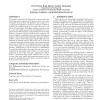Free Online Productivity Tools
i2Speak
i2Symbol
i2OCR
iTex2Img
iWeb2Print
iWeb2Shot
i2Type
iPdf2Split
iPdf2Merge
i2Bopomofo
i2Arabic
i2Style
i2Image
i2PDF
iLatex2Rtf
Sci2ools
122
click to vote
WWW
2008
ACM
2008
ACM
Computable social patterns from sparse sensor data
We present a computational framework to automatically discover high-order temporal social patterns from very noisy and sparse location data. We introduce the concept of social footprint and present a method to construct a codebook, enabling the transformation of raw sensor data into a collection of social pages. Each page captures social activities of a user over regular time period, and represented as a sequence of encoded footprints. Computable patterns are then dened as repeated structures found in these sequences. To do so, we appeal to modeling tools in document analysis and propose a Latent Social theme Dirichlet Allocation (LSDA) model a version of the Ngram topic model in [6] with extra modeling of personal context. This model can be viewed as a Bayesian clustering method, jointly discovering temporal collocation of footprints and exploiting statistical strength across social pages, to automatically discovery high-order patterns. Alternatively, it can be viewed as a dimension...
Related Content
| Added | 21 Nov 2009 |
| Updated | 21 Nov 2009 |
| Type | Conference |
| Year | 2008 |
| Where | WWW |
| Authors | Dinh Q. Phung, Brett Adams, Svetha Venkatesh |
Comments (0)

